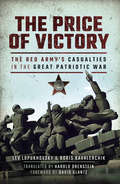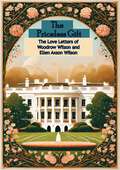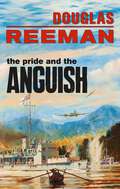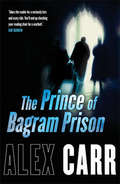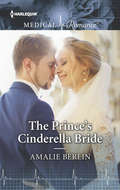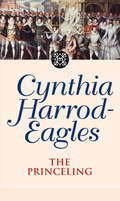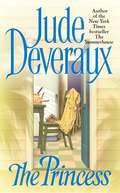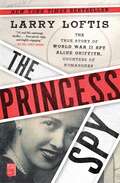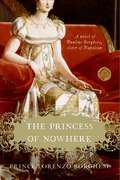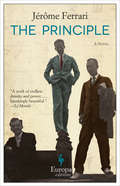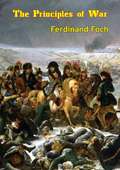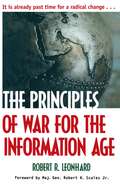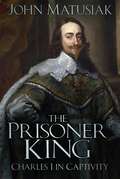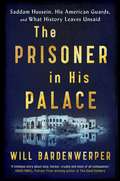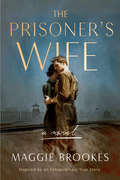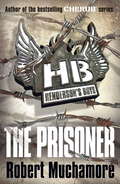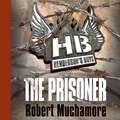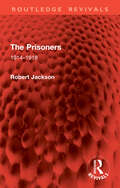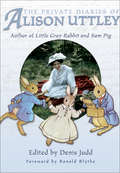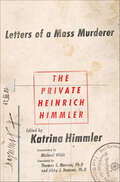- Table View
- List View
The Price of Victory: A Naval History of Britain: 1815?1945
by N. A. RodgerThe final installment of N. A. M. Rodger’s definitive, authoritative trilogy on Britain’s naval history Across two acclaimed volumes, preeminent naval historian N. A. M. Rodger has traced the progress of naval warfare in Britain from the seventh century through to Trafalgar, combining decades of scholarship with original insights and analysis. In this final volume, N. A. M. Rodger delivers a magisterial history of the Royal Navy, beginning after its defeat of Napoleon and concluding in 1945 with the Second World War. At the end of the French and Napoleonic Wars, British sea power was at its apogee. But by 1840, as one contemporary commentator put it, the Admiralty was full of “intellects becalmed in the smoke of Trafalgar.” How the Royal Navy reformed and reinvigorated itself in the course of the nineteenth century is just one thread in this magnificent book, which refuses to accept standard assumptions and analyses. Rodger’s comprehensive narrative goes beyond the conduct of war at sea to tell a sprawling story of naval warfare as a national endeavor. As in previous volumes, the social history of officers and men—and now also women—has a prominent place. Along the way, he describes the development and strategic significance of submarine and navy air forces and the rapid evolution of weapons and ships (from classic Nelsonian type to hybrid steam/sail ships, then armor-clad and the fully armored Dreadnoughts and beyond). He assesses the character and importance of leading admirals—Beatty, Fisher, Cunningham—together with the roles of other less famous but no less consequential figures. Rodger sets all this in the essential context of politics and geo-strategy. Based on a lifetime’s learning, The Price of Victory is a masterful culmination of one of the most significant British historical works in recent decades. Naval specialists will find much that is new and will be invigorated by the originality of Rodger’s judgments; but everyone who is interested in one of the central threads in British history will find it rewarding.
The Price of Victory: The Red Army's Casualties in the Great Patriotic War
by Boris Kavalerchik Lev Lopukhovsky&“A stark picture of war between the Germans and the Soviets, including some very interesting illustration . . . fascinating, if chilling, reading.&”—Firetrench The Red Army&’s casualties during the Second World War and the casualties sustained by the German army they fought are a key element in any assessment of the conflict on the Eastern Front. Since the war ended over seventy years ago, the statistics have been a source of bitter controversy, of claim and counterclaim, as each generation of historians has struggled to uncover the truth. This contentious issue is the subject of this absorbing book. The figures reveal much about the way the war was fought, and they demonstrate the enormous human price the Soviet Union paid for its victory. That is why the statistics have been so strongly contested. Distortion and falsification by official historians have obscured the facts because the issue has been so heavily politicized. Using recently declassified information from the Russian archives, the authors focus in forensic detail on the way the figures were recorded and compiled and seek to explain why, so many years after the war, the full truth about the subject is still far from our reach.
The Price of Vigilance: Attacks on American Surveillance Flights
by Larry TartThe recent forced landing of a U. S. Navy EP-3 surveillance aircraft on Hainan Island after aerial harassment by Chinese fighters underscores that the dangers of the Cold War are not behind us. Reconnaissance-intelligence gathering-has always been one of the most highly secretive operations in the military. Men risk their lives with no recognition for themselves, flying missions that were almost always unarmed and typically pose as weather survey or training flights.
The Priceless Gift: The Love Letters of Woodrow Wilson and Ellen Axson Wilson
by Eleanor Wilson McAdooThe Priceless Gift: The Love Letters of Woodrow Wilson and Ellen Axson Wilson by Eleanor Wilson McAdoo offers an intimate glimpse into the private lives of President Woodrow Wilson and his first wife, Ellen Axson Wilson, through their heartfelt correspondence. Compiled and edited by their daughter, Eleanor, this collection of love letters provides a unique perspective on the deep bond and enduring romance that defined their relationship.Spanning their courtship and early years of marriage, the letters reveal the tender, intellectual, and emotional connection between Woodrow and Ellen. They share not only their hopes and dreams but also the challenges they faced as a couple navigating personal and professional aspirations. Through their words, readers gain insight into the formative experiences that shaped Woodrow Wilson's character and the supportive partnership Ellen provided during his rise to national prominence.Rich with historical and personal significance, The Priceless Gift also sheds light on Ellen Axson Wilson’s intellect, artistic talent, and influence, offering a fuller picture of a First Lady often overshadowed by her husband’s legacy. This deeply moving collection is more than a chronicle of a presidential romance—it is a celebration of love, resilience, and partnership during an era of great change.Perfect for history enthusiasts and romantics alike, this book provides a rare and personal view into one of America’s most notable couples.
The Pride and the Anguish
by Douglas ReemanSingapore, November, 1941. They called it the "Gibraltar of the Far East"—a British rock that could not be taken. But suddenly, in a lightning blow, Singapore may be defeated. Call it incompetence or call it false pride. It doesn't really matter. Just as the warplanes of the Rising Sun take command of the skies, Lt. Ralph Trewin, who was a proud recipient of the Distinguished Service Cross, arrives at Singapore as second-in-command of the gun boat HMS Porcupine. Is it too late to overcome the ignorance and blind optimism he finds in Singapore?
The Pride of Polly Perkins: A touching family saga of love, tragedy and hope
by Joan JonkerWhen tragedy strikes a family, their lives are never the same again... The Pride of Polly Perkins is a captivating saga of a warm Liverpudlian family hit by illness, and a nostalgic look back at the communities of yesteryear, from much-loved author Joan Jonker. Perfect for fans of Cathy Sharp and Katie Flynn.At the age of fourteen, happy-go-lucky Polly Perkins faces untold sadness when her beloved father is diagnosed with tuberculosis. As Tommy's stay in hospital turns from weeks into months, Polly's mother, Ada, becomes increasingly anxious as to how she will make ends meet. In an attempt to help out, Polly takes a job as a flowerseller, and when she sells a buttonhole to Charles Denholme, a member of the Liverpool gentry, she sets in motion a chain of events that changes her life forever... What readers are saying about The Pride of Polly Perkins: 'Joan Jonker is the best writer of good, old-fashioned story telling''This has to be one of the best books I have ever read. It brings out a mixture of emotions all in one book: tears, joy and above all laughter. I could not put it down. I would recommend it to anyone'
The Prince in the Heather
by Eric LinklaterThis is an account, by a world-famous Scottish author, of the greatest manhunt in history. The time is August, 1746: the quarry none other than Bonnie Prince Charlie, fleeing for his life after the disastrous battle of Culloden, the last pitched battle to be fought on British soil. The story, told almost day by day and using journals and other contemporary sources, is one of superb bravery, cold treachery, desperate moonlight escapes, hiding out in caves and pig-styes with the most meagre of supplies, and of the love and devotion of a few faithful Highlanders who gladly offered up their lives for the Prince from over the water. Here is the most spell-binding book about Scotland ever published. It is fact filled and suspenseful but always interesting. Here is Bonnie Prince Charlie at his best, braving deprivation, foul weather, and long marches in bare feet. He relies on help from the poorest to the most aristocratic Scotsmen. Dressed in sodden rags or disguised as a serving man, even a servant woman, his wit, highest nobility, Christian faith, innate kindness and ability to inspire and charm, remain in tact. This is Scotland at its wild, proud, best.
The Prince of Bagram Prison
by Alex CarrAn edge-of-the-seat political thriller set in the murky world of post-9/11 espionageArmy Intelligence reservist Kat Caldwell is teaching Arabic at a military college in Virginia when the order comes: retired spy chief Dick Morrow needs to find a CIA informant who has slipped away from his handler in Spain and may be heading to Morocco. Jamal was a prisoner whom Kat interrogated when she worked at Bagram Airbase in Afghanistan. Having gained his trust, she is now expected to discover his whereabouts on a treacherous trail that leads from Madrid¿s red-light district to the slums of Casablanca. But when a British soldier is murdered just as he is about to give testimony on the death of a Bagram detainee, Kat begins to suspect that the real story here is of the cover-up of US-sanctioned torture. And when in desperation Jamal contacts his former CIA handler, he unwittingly rekindles a bitter struggle between the one man who can save him and the one who wants him dead.
The Prince's Cinderella Bride
by Amalie BerlinOperation Marriage... Prince Quinton Corlow's life was turned upside down the day his divorce was filed and his military papers were executed. Seven years later, the embittered soldier returns, only to walk straight back into his ex-wife's life! But when Quinn discovers he's still married to the one woman who could claim his heart, he realizes he must tackle the past for the future he wants...the future Anais wants, too. But can he convince his Cinderella bride to fight for their love?
The Princeling: The Morland Dynasty, Book 3 (Morland Dynasty #3)
by Cynthia Harrod-Eagles1558: Elizabeth I is on the throne, though still challenged by Mary, and her Protestant faith threatens the Catholic Morland family.The reign of Elizabeth I means that the Morlands must seek new spheres of influence to restore their fortunes. John, heir to Morland Place, rides north to wed the daughter of Black Will Percy, the Borders cattle lord, and learns that the way to win her heart is through blood and battle. His gentle sister, Lettice, has also travelled north to marry the ruthless Scottish baron, Lord Robert Hamilton, and in the treacherous court of Mary, Queen of Scots, she has to learn the bleak and bitter lessons of survival...
The Princeling: The Morland Dynasty, Book 3 (Morland Dynasty #3)
by Cynthia Harrod-Eagles1558: Elizabeth I is on the throne, though still challenged by Mary, and her Protestant faith threatens the Catholic Morland family.The reign of Elizabeth I means that the Morlands must seek new spheres of influence to restore their fortunes. John, heir to Morland Place, rides north to wed the daughter of Black Will Percy, the Borders cattle lord, and learns that the way to win her heart is through blood and battle. His gentle sister, Lettice, has also travelled north to marry the ruthless Scottish baron, Lord Robert Hamilton, and in the treacherous court of Mary, Queen of Scots, she has to learn the bleak and bitter lessons of survival.
The Princess (Montgomery/Taggert)
by Jude DeverauxBestselling author Jude Deveraux surrounds a regal heroine with the intrigue and excitement of a forbidden love in this lush, romantic tale of adventure and passion.Her name is Aria...a beautiful, arrogant princess from a small European kingdom. Stranded in a storm of intrigue near the Florida Keys, she is swept ashore and into the arms of dashing J.T. Montgomery, an officer of the United States Navy. Disdainful at first, Aria is secretly tantalized by the handsome Lieutenant&’s brash independence...and beneath her proud reserve, J.T. discovers a woman of sensuous fire. To escape her enemies, they return to her royal domain—with Aria posing as an American bride. But if their daring charade succeeds, Aria will have to choose—between the kingdom she was born to rule, and the man she was destined to love…
The Princess Spy: The True Story of World War II Spy Aline Griffith, Countess of Romanones
by Larry LoftisWhat to Read in 2021 —The Washington Post The international bestselling author of the &“exciting, suspenseful, inspirational&” (Brad Thor, #1 New York Times bestselling author) Code Name: Lise weaves another exceptional and thrilling hidden history of an ordinary American girl who became one of the OSS&’s most daring spies in World War II before marrying into European nobility. Perfect for fans of A Woman of No Importance and Code Girls.When Aline Griffith was born in a quiet suburban New York hamlet, no one had any idea that she would go on to live &“a life of glamour and danger that Ingrid Bergman only played at in Notorious&” (Time). As the US enters the Second World War, the young college graduate is desperate to aid in the war effort, but no one is interested in a bright-eyed young woman whose only career experience is modeling clothes. Aline&’s life changes when, at a dinner party, she meets a man named Frank Ryan and reveals how desperately she wants to do her part for her country. Within a few weeks, he helps her join the Office of Strategic Services—forerunner of the CIA. With a code name and expert training under her belt, she is sent to Spain to be a coder, but is soon given the additional assignment of infiltrating the upper echelons of society, mingling with high-ranking officials, diplomats, and titled Europeans, any of whom could be an enemy agent. Against this glamorous backdrop of galas and dinner parties, she recruits sub-agents and engages in deep-cover espionage to counter Nazi tactics in Madrid. Even after marrying the Count of Romanones, one of the wealthiest men in Spain, Aline secretly continues her covert activities, being given special assignments when abroad that would benefit from her impeccable pedigree and social connections. Filled with twists, romance, and plenty of white-knuckled adventures fit for a James Bond film, The Princess Spy brings to vivid life the dazzling adventures of a remarkable American woman who risked everything to serve her country.
The Princess of Nowhere: A Novel
by Lorenzo BorghesePrince Lorenzo Borghese, a descendant of the brother-in-law of Napoleon Bonaparte, bursts boldly onto the historical fiction scene with The Princess of Nowhere—a captivating and richly atmospheric re-imagining of the life of the author’s famous ancestor, Princess Pauline Bonaparte Borghese. Author Borghese—whom TV viewers will recognize for his appearance on the hit ABC series, The Bachelor—will enthrall readers of Sarah Dunant and Suzannah Dunn with this masterful blend of fact and fiction, a story of passion, betrayal, and one woman who truly conquered all…even death.
The Principle: A Novel
by Jérôme Ferrari“A novelist whose concern with how we should live and what we can believe puts him in the tradition of Jean-Paul Sartre and Albert Camus” (The Scotsman).Overpopulation, nuclear war, fascism, contemporary capitalism, and climate crisis all play roles in this epistolary novel in which a young philosopher grapples with the life of Werner Heisenberg, the Nobel Prize–winning German physicist.As he examines the dark historical events of the early twentieth century alongside the luminous elegance of Heisenberg’s theoretical work, the narrator provides an intimate account of his own youthful struggles and desperate attempts to make sense of a fractured, globalized world. How could a man with such a beautiful mind have participated in such atrocities? Jérôme Ferrari offers a compelling, unflinching vision of the failings of European culture, a hypnotic glimpse into the mysteries of the physical world, and a deeply personal historical interrogation.
The Principles of War
by Ferdinand FochMarshal Ferdinand Foch was the highest ranking French commander during the First World War. This work, published in 1920, is his manual outlining the principles and strategies of war."Can war be taught? Does its nature allow it to be taught? Are basic questions which all those engaged in the profession of wars have to ponder. With the exception of the common denominator: the man, no two wars have been the same. In spite of its variable nature war schools have flourished. Foch then a lieutenant colonel discussed some theories or principles of war in a series of lectures at the French Staff College in the early years of the present century. These were first published in 1903 and the present edition in 1918. "With this limited scope and study of battles which are long past many changes have taken place in our concept, understanding and nature of war due to improved weapons and mobility, necessitating better tactical use of ground. This historical study leads Foch to a "theory of war, which can be taught and the shape of a doctrine" which his pupils were to be taught to practice. He explains it further: what is meant by these words is the conception and the practical application not of a science of war nor of some limited dogmas.
The Principles of War for the Information Age
by Robert LeonhardOne of the most cogent and respected strategic theorists in today's military sounds the alarm: We have no viable doctrine for tomorrow's war. The advent of the information age renders the hallowed Principles of War useless. Forged in agrarian times and honed by the more modern conflicts of the industrial age, the principles that have guided generations of America's military leaders have become dangerously outmoded. In this, his latest book, Lt. Col. Robert R. Leonhard, author of the influential Art of Maneuver and Fighting by Minutes, proposes a new set of principles, indeed a new approach to armed conflict.
The Prisoner King: Charles I in Captivity
by John MatusiakMuch has been written about Charles I’s reign, about the brutal civil war into which his pursuit of unfettered power plunged the realm, and about the Commonwealth regime that followed his defeat and execution. His reign is one that shaped the future of the British monarch, and his legacy still remains with us today. After more than half a century of comparative neglect, The Prisoner King provides a new and much needed re-examination of the crucial period encompassing Charles I’s captivity after his surrender to the Scots at Newark in May 1646. Not only were the subsequent months before his trial a time when the human dimension of the king’s predicament assumed unparalleled intensity, they were also a critical watershed when the entire nation stood at the most fateful of crossroads. For Charles himself, as subterfuge, espionage and assassination rumours escalated on all fronts, escape attempts foundered, and tensions with his absent wife mounted agonisingly, the test was supreme. Yet, in a painful passage involving both stubborn impenitence and uncommon fortitude in the face of ‘barbarous usage’ by his captors, the ‘Man of Blood’ would ultimately come to merit his unique place in history as England’s ‘martyr king’.
The Prisoner in His Palace: Saddam Hussein, His American Guards, and What History Leaves Unsaid
by Will BardenwerperThe Prisoner in His Palace is an evocative and thought-provoking account of how the lives of twelve young American soldiers deployed to Iraq are upended when they’re asked to guard the most ‘high-value detainee’ of all, the notorious dictator Saddam Hussein. What the self-dubbed ‘Super Twelve’ experience in the autumn of 2006 is cognitive dissonance at its most extreme. Expecting to engage with the enemy ‘outside the wire’, they’re suddenly tasked with guarding and protecting a notorious dictator until he can be hanged. Watching over Saddam in a former palace the soldiers dub ‘The Rock’ and regularly transporting their prisoner to his raucous trial, they gradually begin to question some of their firmest beliefs. Rather than the snarling beast they expect, Saddam proves confoundingly complex – voluble, charming and given to surprising displays of affection. Perhaps most shockingly, in his Spartan stoicism and the courage he shows in facing death he eventually becomes a role model. Employing a timeline that switches between present and past, The Prisoner in His Palace contrasts the man entrusted to the Super Twelve’s care – a grandfatherly figure who proves ‘good company’ – with a younger version of Saddam who is unspeakably ruthless, views murder and torture as legitimate tools and constantly keeps those around him in a blind panic. The magic of this book is that Bardenwerper keeps us on edge even though we know how it will end. We immediately sense that the Super Twelve will be forever changed by their experience, and we wonder if we ourselves will. In this artfully constructed narrative, Saddam, the ‘man without a conscience’, manages to get everyone around him to examine theirs.
The Prisoner's Wife
by Maggie BrookesInspired by the true story of a daring deception that plunges a courageous young woman deep into the horrors of a Nazi POW camp to be with the man she loves.In the dead of night, a Czech farm girl and a British soldier travel through the countryside. Izabela and prisoner of war Bill have secretly married and are on the run, with Izzy dressed as a man. The young husband and wife evade capture for as long as possible—until they are cornered by Nazi soldiers with tracking dogs. Izzy's disguise works. The couple are assumed to be escaped British soldiers and transported to a POW camp. However, their ordeal has just begun, as they face appalling living conditions and the constant fear of Izzy's exposure. But in the midst of danger and deprivation comes hope, for the young couple are befriended by a small group of fellow prisoners. These men become their new family, willing to jeopardize their lives to save Izzy from being discovered and shot.The Prisoner's Wife tells of an incredible risk, and of how our deepest bonds are tested in desperate times. Bill and Izzy's story is one of love and survival against the darkest odds.
The Prisoner: Book 5 (Henderson's Boys #5)
by Robert MuchamoreOne of Henderson's best agents is being held captive in Frankfurt. A set of forged record cards could be his ticket to freedom, but might just as easily become his death warrant. A vital mission awaits him in France - if he can find a way to escape.
The Prisoner: Book 5 (Henderson's Boys #5)
by Robert MuchamoreOne of Henderson's best agents is being held captive in Frankfurt. A set of forged record cards could be his ticket to freedom, but might just as easily become his death warrant. A vital mission awaits him in France - if he can find a way to escape.(P) Hodder Children's Books 2016
The Prisoners: 1914–1918 (Routledge Revivals)
by Robert JacksonOriginally published in 1989, Robert Jackson’s outstanding book revealed a whole area of wartime experience which had been neglected. It was the first book of its kind to cover all aspects of the years behind the wire in Prisoner of War (POW) camps during the First World War. The author drew extensively on unpublished personal narratives from the archives of the Imperial War Museum to provide a broad cross-section of life in the POW camps. He also dealt with the work of the Red Cross, internment in neutral countries, treatment of prisoners immediately after capture and escapes.
The Private Diaries of Alison Uttley: Author of Little Grey Rabbit and Sam Pig
by Denis JuddPopular childrens author, Alison Uttley (Little Grey Rabbit and Sam Pig) spent over 40 years writing diaries. Professor Denis Judd, who knew Alison and has previously written her biography, reveals a different side to the writer whose husband committed suicide and whose close relationship with her son is recorded in detail. But the magic of the author rings through on every page as she writes about her daily life in Berkshire, the red lipped fisherwife near neighbor (better known as Enid Blyton!) and her tempestuous relationship with her illustrators. She also writes endearingly about the changing seasons, reflecting much of her adult writing. These beautifully written diaries have been skillfully edited by Denis Judd, one of the Trustees of her Estate and a renowned biographer in his own right. Wonderfully written with a truly nostalgic look at days long gone, this is a must-read not just for fans of Alison Uttley's work but for anyone who enjoys good writing.
The Private Heinrich Himmler: Letters of a Mass Murderer
by Michael WildtThe English translation of the letters of Heinrich Himmler and his wife, recently authenticated by the Bundesarchiv and serialized in Die WeltAt the end of World War II, it was assumed that the letters of Heinrich Himmler were lost. Yet sixty years after Himmler's capture by British troops and subsequent suicide, the letters mysteriously turned up in Tel Aviv and, in early 2014, excerpts were published for the first time by the Israeli newspaper Yediot Aharonot providing a rare, if jarring, glimpse into the family life of one of Hitler's top lieutenants while he was busy organizing the mass extermination of the Jews. It was generally held that Himmler, once appointed head of the SS, blended seamlessly into the Nazi hierarchy. The image that emerges, however, is more subtle. Himmler is seen here as a man whose observations can often be characterized by their unpleasant banality; a man whose obsession with family life ran alongside a brutal detachment from all things human, a serial killer who oversaw the persecution and extermination of all Jews and other non-Aryans, and those opposed to the regime. His letters remove any doubt that he was the architect of the Final Solution, and a man who was much closer to Hitler than many historians previously thought.The letters in this edition were arranged by Katrin Himmler, the great-niece of Heinrich and Marga Himmler, and Michael Wildt, a renowned expert on the Nazi regime, who also provide historical context to the letters and their author. The entire work was translated by Thomas S. Hansen and Abby J. Hansen.

